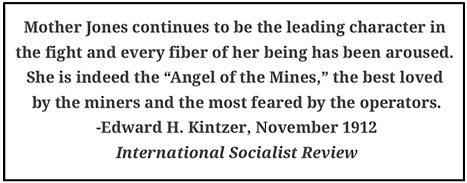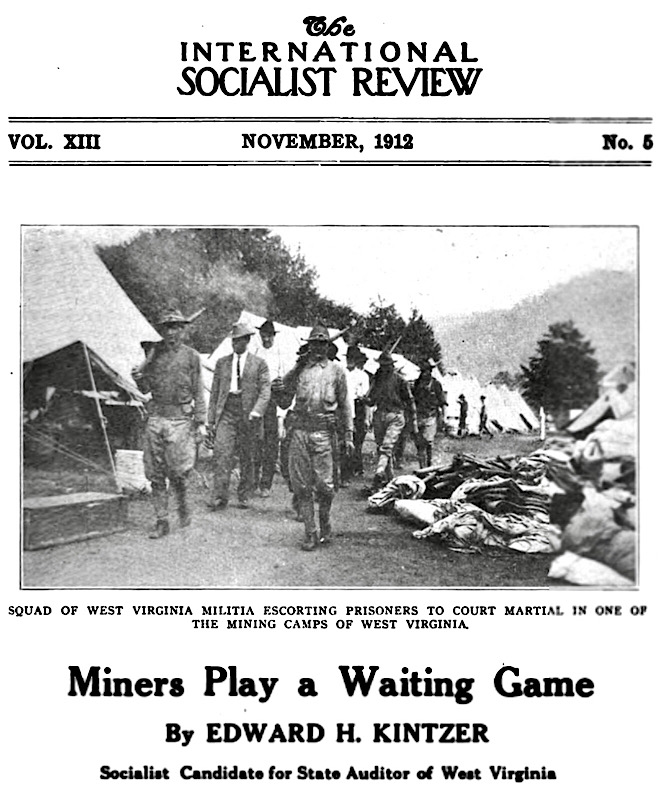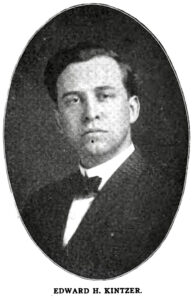 —————
—————
Hellraisers Journal – Thursday November 7, 1912
West Virginia Miners Play a Waiting Game
-by Edward H. Kintzer, Socialist Candidate for State Auditor
From the International Socialist Review of November 1912:
WITH the calmness of seasoned soldiers, with a purpose that presages no good to the operators, with defiance that brooks no interference with that purpose, the battling miners of West Virginia await the coming war-of-the-ballots.
In dealing with the armed mine guards these mountaineers were taught valuable lessons in solidarity and cohesion which made them effective in meeting this force. So, after delivering a blow of direct action against the operators, with equal intelligence they are preparing to strike at the ballot box. They have organized themselves in spirit if not in fact, having learned to do by concerted action whatever is to be done.
They are not living in a fool’s paradise expecting the capitalist orders to collapse because a majority might wish it to. Back of their political action there is something more tangible than a mere expression of choice.
And well there should be, for heretofore no election has gone against the operators. They will stop at nothing to purchase votes and stuff ballot boxes. They have bought legislators like they purchase mine props, “made” governors with impunity, and with open effrontery placed two senators in congress against the wishes of the people.
Frank Bohn, associate editor of the REVIEW, while recently touring West Virginia on a speaking campaign, said: “The situation here regarding Senator Watson ought to receive wide publicity. There is nothing else like it. Other Watsons exist but none of them are in congress.”
It is the coal industry and organized “Big Business” that the miners must oppose-these interests that named Watson and Chilton United States senators.
SOCIALISM IS EASY.
It is not difficult to teach these battling miners the fundamentals of Socialism, for the class struggle to them is very apparent and the hallucination of “dividing up” and “destroying the homes” has no terrors for them. They have nothing to divide and no home to destroy. Having recently been evicted they know that nothing could accomplish these things more effectively than capitalism. Their only assets are experience, hope and determination. This experience suggests action, their hope is Socialism and their determination means victory.
Frank J. Hayes, vice-president of the national organization of the United Mine Workers, in a recent letter states the political situation quite clearly. He said:
We have an excellent chance of electing the entire Socialist ticket in Kanawha county. The miners poll 40 per cent of the total vote in this county and they are practically all Socialists, made so by the present strike.
This is the county [Kanawha] in which Charleston, the capital of the state, is located, and, moreover, if we capture the political power of this big county it will practically insure the success of our strike. It is a great opportunity.
Politicians of the old school are admitting that the Socialist ticket will win. Even last March, before the strike, Adjutant General Elliott, absolute dictator by right of martial law over Paint and Cabin Creek districts, stated to the writer: “Unless Roosevelt is nominated by the Republicans there is some question whether the Socialists will be first or second.” He stated that he had been over the lower section (meaning Kanawha county) and knew. He resides at Charleston.
Thomas L. Tincher, a locomotive engineer, is the Socialist candidate for sheriff. He is making the guard system the issue in the campaign.
[Says Tincher:]
A Socialist sheriff would solve the mine guard problem quickly. All he would have to do would be to enforce the law and the mine guard would become a useless institution.
With exceptional outbreaks of hostility between the mine guards and the miners, the situation in the martial law district is quiet. The operators, mine guards and miners are disposed to play a waiting game.


